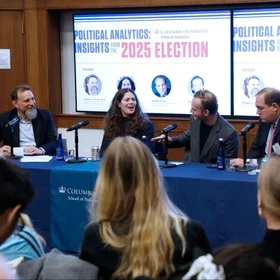As Columbia University's Director of Columbia Community Service, Joan Griffith-Lee is charged with engaging the University's community around campaigns that will improve other people’s lives. It’s been a rewarding position, and to fully understand the challenges and opportunities within her position, she enrolled in the School of Professional Studies' Nonprofit Management program in order to educate herself further in management and fundraising. We emailed her about her experience in applying what she learns in the classroom to her full-time job and how she balances that job with her return to the classroom.
As a mid-career professional, why did you enroll in the Master’s program in Nonprofit Management?
I enrolled in Nonprofit Management after realizing that I needed to learn more about fundraising and managing a non-profit. I wanted to gain a better understanding of my role as a fundraiser. During my pursuit of that degree, I discovered other critical components that are necessary to managing a non-profit.
I am very grateful that the course selections have been expanded to include a range of classes that focus on the entire spectrum.
What are the elements of Nonprofit Management that matter beyond fundraising?
While the overall goal of any fundraiser is to raise money for the future sustainability of the non-profit, there are many aspects of Nonprofit Management that are equally important. For example, having a capable, engaged and informed board is equally important. Boards can limit or destroy the work, success and growth of a non-profit even when revenues are high.
Another element is continuous learning, which is an important part of strengthening any organization. It must be integrated into the strategic planning for higher chances of success. Fundraising can provide the much needed resources but the other arms of Nonprofit Management are also critical to making the organization successful.
How do you balance your Nonprofit Management degree with the demands of a full-time job?
I realize that taking no more than two classes per semester has helped to maintain balance between work and school. Also, I am fortunate to work in an atmosphere where I can implement much of what I've learned and continue to learn into my daily routine. Many times, I am very excited when I discover something in class that I know I can take back to my office and implement right away.
I balance class work and a full time job by taking notes from readings and class sessions specifically for the Columbia Community Service project. I also schedule class time into my daily routine as meetings since the reason for my degree is to improve my job performance.
What are some interesting takeaways that you are getting out of the program?
Currently, I am taking the Communications and Marketing class, which is teaching me the importance of knowing my audience and how to strengthen the brand of the project. I have started to implement some of the tools being taught in class and I am excited to see firsthand what works and does not work for CCS. Being able to utilize what I learn in class also enables me to make recommendations to the 60 or more community organizations that we work with every year.
I can view the nonprofit as a professional and make recommendations or answer their questions. I would not be able to do this without the knowledge I gained from my Nonprofit Management experience.
Nonprofit Management is not a single person process but requires many hands and a well-trained team. It’s not about who is in charge but about the impact that the work will produce and those who will benefit in the long run. It’s a process that takes time, money and commitment from all levels of the organization. Every player - staff, board, donor, non-donor, beneficiary, public and private partners, and competitors - are all important and they play a role in the process. I've learned that I must speak with my audience (my donors and potential donors) and not to them.
How will this degree fit into your future career plans?
It is my goal to continue to expand the Campaign and enhance its leverage on the Morningside campus to the point where every employee and retiree knows about the work of CCS and are inspired to support the organizations that work to provide a range of social services in the Upper West Side and Harlem. When I am convinced that this has been accomplished, I hope to move on to a project that is even more challenging.


